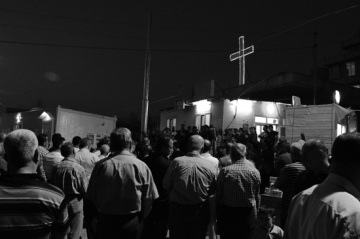Vatican City, 8 September 2014 (VIS) – This Sunday the Holy Father sent a video message to all the representatives of the Christian Churches, ecclesial communities and all heads of world religions who will meet in the Belgian city of Antwerp from 7 to 9 September for the International Meeting for Peace organised by the Sant’Egidio Community. This year’s theme, “Peace is the Future”, commemorates the dramatic outbreak of the First World War one hundred years ago, and evokes a future in which mutual respect, dialogue and cooperation will help banish the sinister phantom of armed conflict.
“In these days, in which many people throughout the world need help to find the way to peace, this anniversary teaches us that war is never a satisfactory means of redressing injustice or reaching balanced solutions to social and political discord. In the final analysis every war, as Pope Benedict XV stated in 1917, is a ‘useless massacre’. War drags populations into a spiral of violence that is then shown to be difficult to control; it demolishes what generations have worked to build and paves the way for injustice and even worse conflicts.”
Pope Francis stressed that “we cannot remain passive” when faced with “the innumerable conflicts and wars, declared and undeclared, that nowadays afflict the human family and ruin the lives of the youngest and of the elderly, poisoning long-standing relationships of co-existence between different ethnic groups and religions.” He remarked that with the power of prayer “our various religious traditions are able, in the spirit of Assisi, to offer a contribution to peace. … I hope that these days of prayer and dialogue will serve to remind us that the search for peace and understanding through prayer can create lasting bonds of unity and prevail over the passions of war. War is never necessary, nor is it inevitable. There is always an alternative: the path of dialogue, encounter and the sincere search for truth.”
“The moment has arrived for the heads of all religions to cooperate effectively in the task of healing wounds, of resolving conflicts and seeking peace. Peace is the sure sign of commitment to God’s cause.” The Pontiff concluded by encouraging all those present to be “builders of peace” and to convert communities into “schools of respect and dialogue with those of other ethnic or religious groups, places in which we learn to overcome tensions, promote equitable and peaceful relations among peoples and social groups, and build a better future for the generations to come.”




